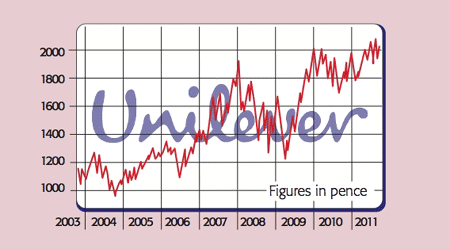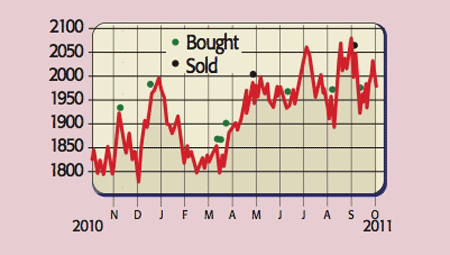Shares in focus: consumer goods behemoth Unilever
Consumer goods maker Unilever owns a host of well known brands. But the blue-chip giant faces intense competition in a market squeezed by weaker levels of customer spending. So, should you buy Unilever shares? Phil Oakley reports.
Get the latest financial news, insights and expert analysis from our award-winning MoneyWeek team, to help you understand what really matters when it comes to your finances.
You are now subscribed
Your newsletter sign-up was successful
Want to add more newsletters?

Twice daily
MoneyWeek
Get the latest financial news, insights and expert analysis from our award-winning MoneyWeek team, to help you understand what really matters when it comes to your finances.

Four times a week
Look After My Bills
Sign up to our free money-saving newsletter, filled with the latest news and expert advice to help you find the best tips and deals for managing your bills. Start saving today!
What does the company do?
Unilever is a global consumer goods company. Its business focuses on four key areas that boast many top brands: savoury, dressings and spreads (Knorr, Flora, Hellmann's and Marmite); ice cream and beverages (Magnum, Ben & Jerry's, Lipton and PG tips); personal care (Dove, Radox, Signal, VO5, Vaseline) and home care (Comfort, Domestos, Cif, Surf and Persil). The group had sales of €44.3bn in 2010.
What is the company's history?
It was formed in 1930 through the merger of soap company Lever Brothers with Margarine Unie, a Dutch margarine business. Initially, the group concentrated on its core soap and margarine operations before diversifying in the 1940s and 1950s into frozen foods, freeze-dried vegetables, canned goods, shampoos and toothpaste.
After failing to merge with Allied Breweries during the 1960s, the 1970s and 1980s saw large acquisitions, such as Lipton Tea, Brooke Bond, Calvin Klein and Faberg. As a result, Unilever became an unwieldy and unfocused business that failed to match the financial returns of its peers. In response it has rationalised its brand portfolio and sold businesses during the last ten years, with an emphasis on tapping emerging markets, growing volumes and improving profitability.
MoneyWeek
Subscribe to MoneyWeek today and get your first six magazine issues absolutely FREE

Sign up to Money Morning
Don't miss the latest investment and personal finances news, market analysis, plus money-saving tips with our free twice-daily newsletter
Don't miss the latest investment and personal finances news, market analysis, plus money-saving tips with our free twice-daily newsletter
Who runs Unilever?
Paul Polman has been CEO since 2009, having joined in 2008. He was previously chief financial officer at Nestl. He was paid €2.8m in 2010. Former Electrolux CEO, Michael Treschow, is chairman. Jean-Marc Huet is chief financial officer.
How's trading?
Results for the six months to June 2011 saw sales increase by 4.1% to €22.8bn, with operating profits increasing by 8% to €3.3bn. Earnings per share increased by 10% to €0.79. Emerging markets continued to perform well with underlying sales growth of 9%, while western Europe remained sluggish. Encouragingly, Unilever managed to increase prices, grow volumes and gain market share in key areas. Lower advertising expenditure helped offset higher input costs and preserve margins.
What's the outlook?
Challenging. While emerging markets are expected to grow, the outlook for consumer spending in developed markets is weak. Unilever faces intense competition both globally and locally and much will depend on how consumers trade off continuing product innovations against price. The investment by supermarkets in own-label products is also a constant competitive threat. High input prices remain a concern, although these will be offset slightly by lower advertising costs in 2011.
The analysts
Of the 25 analysts surveyed by Bloomberg, 17 say "buy", five "hold" and three "sell". The average price target is 2,269p 13% above the current share price. Most bullish is Sanford C Bernstein with a 2,550p price target, whereas AlphaValue is most bearish with a 2,172p target.
Our view
Aquality blue-chip stock, and a solid holding in this kind of market.
The numbers

Stockmarket code: ULVR
Share price 2,003p
Market cap: £56.3bn
Net assets (June 2011) €15.9bn
Net debt (June 2011) €8.1bn
P/E (current year estimate) 14.9x
Yield (prospective) 3.8%
Directors' holdings

Most director dealing activity over the past year has been associated with the vesting of company share plans. Investors in Unilever can take comfort in the demanding shareholding guidelines for the executive directors. The chief executive is expected to achieve and maintain 400% of his base salary in shares, with the chief financial officerrequired to hold 300%. Recent deals are shown in the chart on the left, and share holdings below.
Directors and shares held
P Polman: *181,986
JM Huet: 23,000
M Treschow: *30,158
Source: 2010 Annual Report
* includes shares in Unilever NV.
Get the latest financial news, insights and expert analysis from our award-winning MoneyWeek team, to help you understand what really matters when it comes to your finances.
Phil spent 13 years as an investment analyst for both stockbroking and fund management companies.
-
 Should you buy an active ETF?
Should you buy an active ETF?ETFs are often mischaracterised as passive products, but they can be a convenient way to add active management to your portfolio
-
 Power up your pension before 5 April – easy ways to save before the tax year end
Power up your pension before 5 April – easy ways to save before the tax year endWith the end of the tax year looming, pension savers currently have a window to review and maximise what’s going into their retirement funds – we look at how